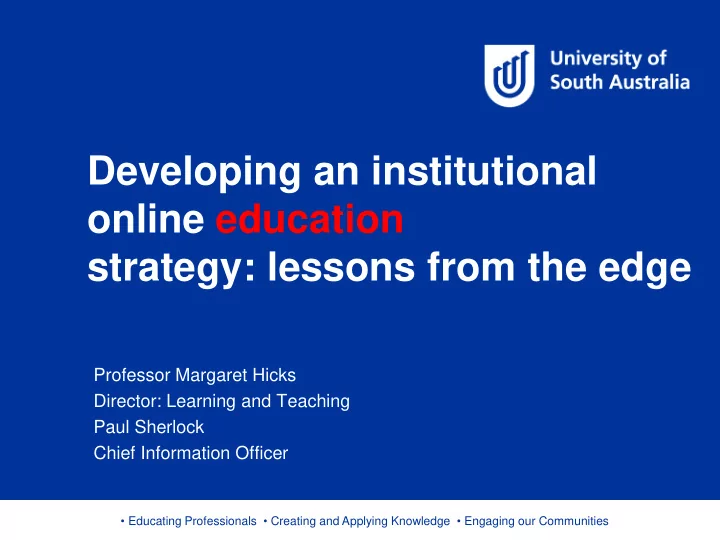

Developing an institutional online education strategy: lessons from the edge Professor Margaret Hicks Director: Learning and Teaching Paul Sherlock Chief Information Officer • Educating Professionals • Creating and Applying Knowledge • Engaging our Communities
Access to Global knowledge mobility Technology Industry Competition integration
Streamlined status quo Niche dominator Transformer
Key Questions • MOOCs - trend or a fad? • role of open educational resources? • online or blended learning? • attracting students to campus? • role of campus master planning? • business models for online learning? • external partnerships? • future of academic work? • supporting academic staff? • relationship between pedagogy, space and technology?
# 1 – Shared Understanding
# 2 – Critical Elements • Student Satisfaction/Experience • Quality • Growth/Profitability • Staff Capability • Digital Infrastructure • Marketing/Brand • Facilities Master Planning
# 3 – Engagement • Uncovering Current Practice • Surprises • Innovative activity • Different viewpoints • Long term/short term activity • Holistic view • 1000 flowers blooming • Course based versus programmatic approaches
# 4 – Assessing Capability • Staff Capability • Digital Infrastructure • Facilities Master Planning • Marketing/Brand Technology Marketing Pedagogy Spaces
# 5 – A Call to Action • Senior leadership understanding and commitment • Coalition of the willing o learning and teaching, IT – at both a central and faculty level o supported by other key actors (marketing, facilities) • Professional development • Policy and governance frameworks
Technology Has Limits
http://creativecommons.org/licenses/by/4.0/ Questions 1. Does your University have an online education strategy? 2. If you do is it separate to your overall teaching and learning strategy? 3. Do you need an online education strategy to enable online education activity? 4.Are there other things to consider?
Recommend
More recommend